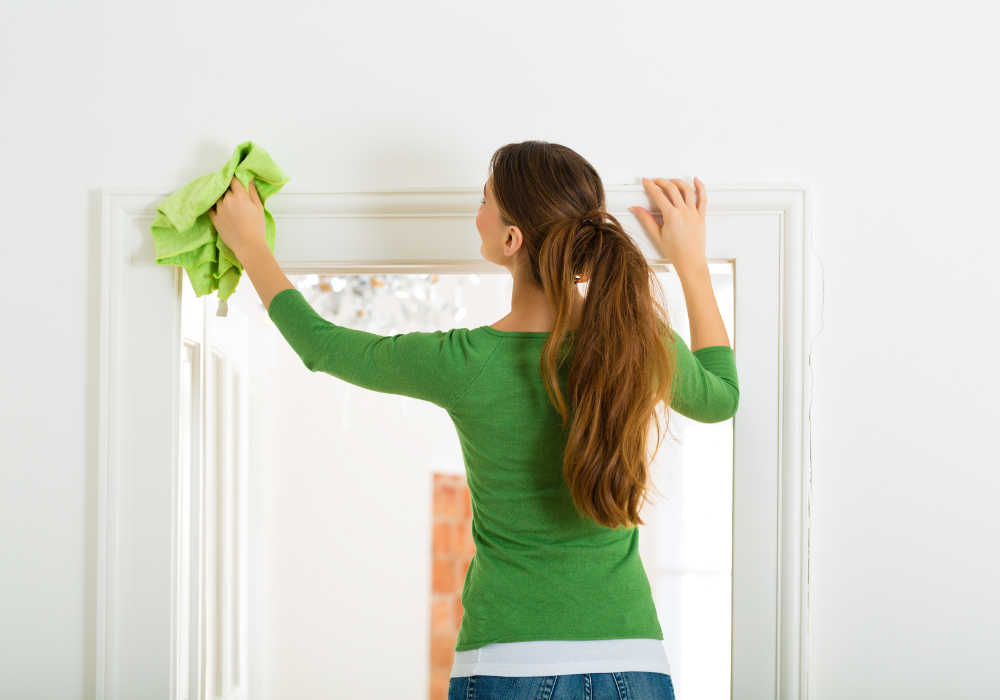
Our Germ Buster Spray is Great for keeping surfaces clean and sanitized.
Here are some homemade natural cleaning tips:
Lemons
The acid in lemon juice removes dirt and rust stains. It’s especially effective when mixed with salt, which makes “an excellent scouring paste,” says Karyn Siegel-Maier, author of The Naturally Clean Home ($9, amazon.com).
Price: About 50 cents a lemon.
Use Them to Clean Your…
Countertops: Dip the cut side of a lemon half in baking soda to tackle countertops; wipe with a wet sponge and dry. Don’t use on delicate stone, like marble, or stainless steel (it may discolor).
Cutting boards: To remove tough food stains from light wood and plastic cutting boards, slice a lemon in half, squeeze onto the soiled surface, rub, and let sit for 20 minutes before rinsing.
Dishes: To increase the grease-cutting power of your dishwashing detergent, add a teaspoon of lemon juice.
Faucets: Combat lime scale by rubbing lemon juice onto the taps and letting it sit overnight. Wipe with a damp cloth.
Garbage disposal: Cut a lemon in half, then run both pieces through the disposal. “The lemon cleans it and makes it smell great,” says Linda Mason Hunter, a coauthor of Green Clean ($13.50, amazon.com).
Grout: Spilled morning coffee on your tile countertop or backsplash? Here’s how to tackle grout stains: Add lemon juice to 1 or 2 teaspoons cream of tartar (an acidic salt that acts as a natural bleaching agent) to make a paste. Apply with a toothbrush, then rinse.
Hands: When you touch raw fish, the smell can linger on your fingers. Rub your hands with lemon juice, which will neutralize the odor.
Laundry: To brighten whites, add 1/2 cup lemon juice to the rinse cycle for a normal-size load.
Plastic food-storage containers: To bleach stains from tomato soup and other acidic foods on dishwasher-safe items, rub lemon juice on the spots, let dry in a sunny place, then wash as usual.
Extracted from plants, some essential oils can kill bacteria and mold. They’re very strong, so don’t go overboard: One drop of peppermint oil is as potent as 30 cups of peppermint tea.
Price: $14 for 5 milliliters at health-food stores.
Use Them to Clean Your…
Combs and brushes: Fill a container with 1½ cups water, ½ cup distilled white vinegar, and 20 drops tea-tree, lavender, or eucalyptus oil. Soak combs and brushes for 20 minutes. Rinse and air-dry.
Scuffed floors: Apply two to four drops of tea-tree oil to the spots. Wipe excess oil with a cloth and rub in distilled white vinegar.
Gum-encrusted items: Orange oil is great at removing this sticky offender from various materials. (Don’t worry: It shouldn’t stain fabrics. But do launder immediately.) Apply with a cotton ball.
Shower doors: Wipe scum-covered glass doors with a few drops of lemon oil twice a month. It will protect them from grime buildup.
Toilets: Add 2 teaspoons tea-tree oil and 2 cups water to a spray bottle. Shake, then spritz along the toilet’s inside rim. Let sit for 30 minutes; scrub. You can also place a few drops of your favorite oil on the inside of the toilet-paper tube. “Every time the paper is used, the scent will be released,” says Siegel-Maier.
Windows: Mix 2 ounces water and 10 drops lavender or lemongrass oil to wipe grime off windows. Bonus: These oils may repel flies.

